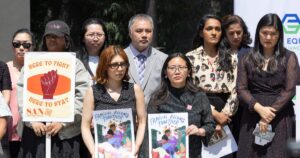As federal immigration raids continue to upend life in Los Angeles, Asian American leaders are rallying their communities to raise their voices in support of Latinos, who have been the primary targets of the enforcement sweeps, warning that neighborhoods frequented by Asian immigrants could be next.
Organizers say many Asian immigrants have already been affected by the Trump administration’s crackdown on immigrants working in the country without documentation. Dozens of Southeast Asian immigrants in Los Angeles and Orange counties whose deportation orders had been on indefinite hold have been detained after showing up for routine check-ins at U.S. Immigration and Customs Enforcement offices, according to immigration attorneys and advocacy groups.
In recent months, a number of Cambodian, Laotian and Vietnamese immigrants whose deportation orders had been stayed — in some cases for decades — have been told that those orders will now be enforced.
The Asian immigrants being targeted are generally people who were convicted of a crime after arriving in the U.S., making them eligible for deportation after their release from jail or prison. In most cases, ICE never followed through because the immigrants had lived in the U.S. long enough that their home countries no longer recognized them as citizens.
“Our community is much more silent, but we are being detained in really high numbers,” said Connie Chung Joe, chief executive of Asian Americans Advancing Justice Southern California. “There’s such a stigma and fear that, unlike the Latinx community that wants to fight and speak out about the injustices, our community’s first reaction is to go down and get more and more hidden.”
On Thursday, more than a half dozen leaders representing Thai, Japanese and South Asian communities held a news conference in Little Tokyo urging community members to stand together and denounce the federal action as an overreach.
President Trump came into office in January vowing to target violent criminals for deportation. But amid pressure to raise deportation numbers, administration officials in recent months have shifted their focus to farmworkers, landscapers, street vendors and other day laborers, many of whom have been working in the country for decades.
While an estimated 79% of undocumented residents in L.A. County are natives of Mexico and Central America, Asian immigrants make up the second-largest group, constituting 16% of people in the county without legal authorization, according to the Migration Policy Institute. Across the U.S., Indians make up the third-largest group of undocumented residents, behind Mexicans and Salvadorans.
According to the Pew Research Centerthe L.A. metropolitan area is home to the largest populations of Cambodians, Koreans, Indonesians, Filipinos, Thai and Vietnamese people in the U.S.
So far, the highest profile raids in Southern California have centered on Latino neighborhoods, targeting car washes, restaurants, home improvement stores, churches and other locales where undocumented residents gather and work.

Los Angeles City Councilmember Ysabel Jurado and Peter Gee of the Little Tokyo Service Center were among the speakers who denounced ICE raids during a news conference Thursday.
(Myung J. Chun / Los Angeles Times)
But Asian businesses have not been immune. A raid outside a Home Depot in Hollywood happened across the street from Thai Town, where organizers have seen ICE agents patrolling the streets. In late May, Dept. of Homeland Security agents raided a Los Angeles-area nightclub, arresting 36 people they said were Chinese and Taiwanese immigrants in the country without authorization.
In Little Bangladesh, immigration agents recently detained 16 people outside a grocery store, according to Manjusha P. Kulkarni, executive director of AAPI Equity Alliance, a coalition of more than 50 community-based organizations.
“They will come for us even more in the coming days and weeks,” Kulkarni said. “So we are only protected when we’re in solidarity with our fellow Angelenos.”
From June 1 to 10, at the start of the federal sweeps, ICE data shows that 722 people were arrested in the Los Angeles region. The figures were obtained by the Deportation Data Projecta repository of enforcement data at UC Berkeley Law.
A Times analysis found that 69% of those arrested during that period had no criminal convictions. Nearly 48% were Mexican, 16% were from Guatemala and 8% from El Salvador.
Forty-seven of the 722 individuals detained — or about 6% — were from Asian countries.
“We know the fear is widespread and it is deep,” said Assemblymember Mike Fong, a Democrat whose district takes in Monterey Park and West San Gabriel Valley, areas with large Asian immigrant populations.
Los Angeles City Council Members Nithya Raman and Ysabel Jurado Spoke of the repercussions the raids were having on immigrant communities. Raman is Indian American, and Jurado is Filipino American.
Jurado said undocumented Filipinos make up a sizeable portion of the region’s caregivers, tending to both elderly people and young children.
“Their work reflects the deepest values of our communities: compassion, service and interdependence,” Jurado said. “Their labor is essential, and their humanity must be honored.”
Jurado and Raman called on the federal government to end the raids.
“This is such an important moment to speak out and to ensure that the Latino community does not feel alone,” Raman said. “I also want to make it clear to every single person who is Asian American, these aren’t just raids on others. They’re raids on us.”
Staff writer Rachel Uranga contributed to this report.
This article is part of The Times’ equity reporting initiative, funded by the James Irvine Foundationexploring the challenges facing low-income workers and the efforts being made to address California’s economic divide.











